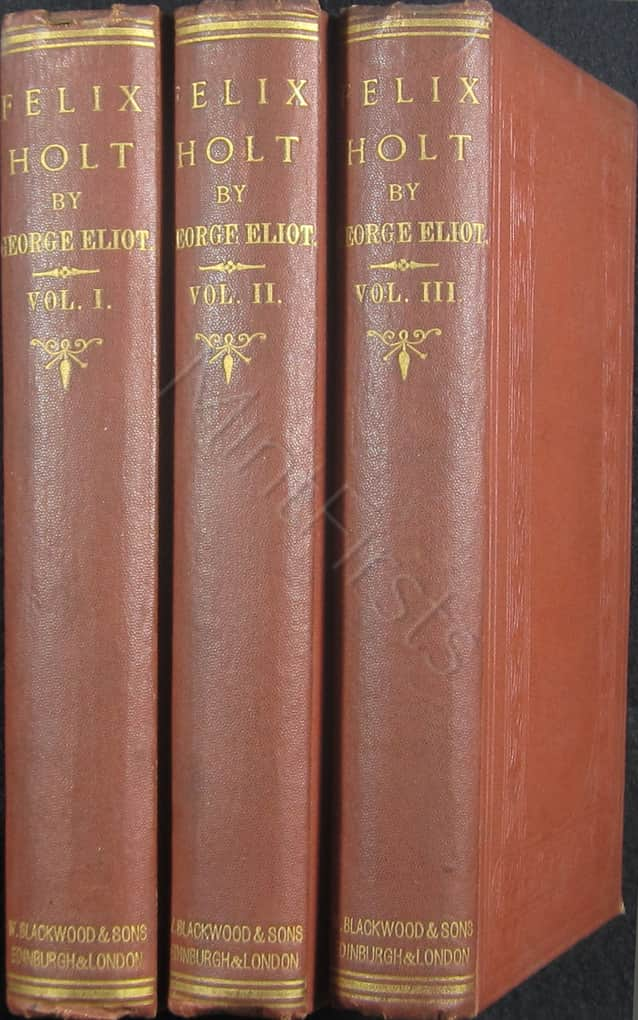Established
2004
Relaunched
2024
Our booksHow we tradeAbout usCredits & thanksYour account
- Home page
- Our books
- How we trade
- About us
- Credits & thanks
- Your account
- Your cart
MENU
Felix Holt the Radical
First edition of George Eliot's Felix Holt the Radical

George Eliot ⦗Mary Ann Evans, 1819–1880⦘
First edition. With half-titles and 4 pp. of integral advertisements to rear of vol. iii. 3 vols. 8vos. Pp. [iv], 303, [1, blank]; [iv], 290; [iv], 283, [1, blank], [4, publisher's catalogue titled "Recent Publications"]. Publisher's sand-grained cinnamon cloth, covers blocked in blind, spines lettered and ruled in gilt, all edges untrimmed; pale yellow-coated endpapers. Issued in five different bindings, labelled "A" through "E" by Carter, with "A" through "C" branded simultaneous primary bindings, with no priority established, and "D" and "E" following.
The present set is in Carter's variant "B" binding, with "W. Blackwood" rather than "Wm. Blackwood" to foot of spines as noted in Baker & Ross, note 2, p.232. Small contemporary bookseller's ticket on the front pastedown of each volume (R. H. Sutton of 120 Portland St., Manchester). Backstrips lightly rubbed at head and foot of each volume. An exceptional, mostly unopened set, with only the first half of vol. ii cut open, and vols. i and iii entirely undisturbed.
Published around the time of the Second Reform Act of 1867, which expanded the voting franchise beyond the landed classes, Eliot's fifth novel "vividly evokes the political ferment and corrupt electioneering tactics" employed in the wake of its predecessor Act of 1832. (Oxford Companion to English Literature). Rejected by Smith, Elder, who had previously published Romola (1863), the manuscript was then offered to Blackwood who agreed a £5,000 advance for the copyright. Notwithstanding critical barbs about its focus on politics, the novel was commercially successful with "nearly 5,000 copies... sold in the first year" (ODNB).
[Carter, Binding Variants, pp. 111–112; Baker & Ross A8.1; Parrish pp. 20–21; Sadleir 814; Wolff 2058]
edition
first edition
format
hardback
publisher
William Blackwood and Sons
published in
Edinburgh and London
publication year
1866
ISBN
not assigned
height × width
20 × 13 cm
genre
literary fiction
language
English
binding style
cloth
binding state
original binding
condition
fine
GBP£ 2,000
EUR€ 2,290
USD$ 2,680
ref.6C2 743